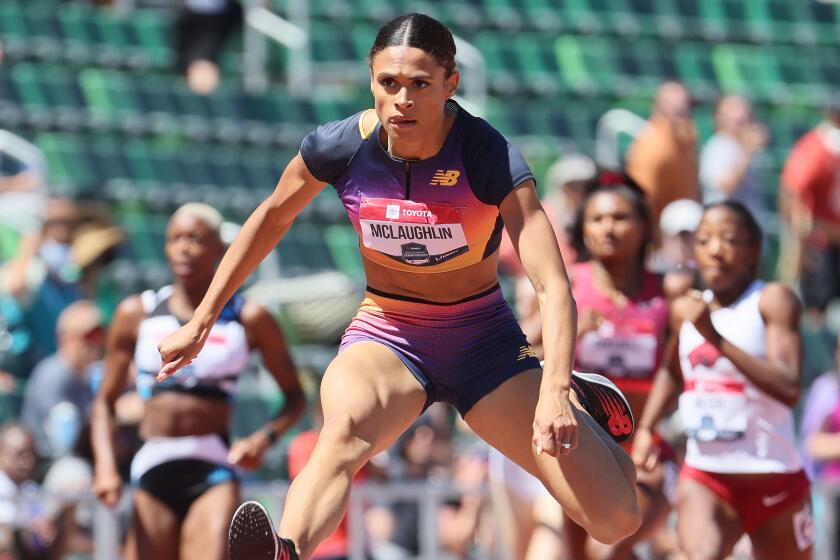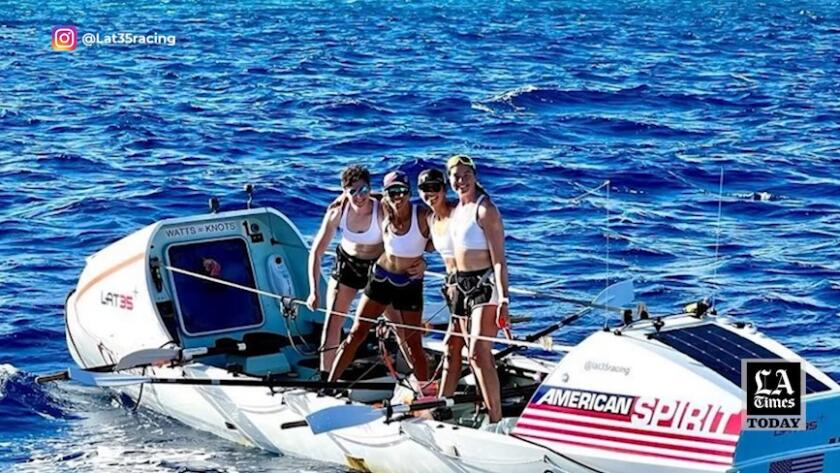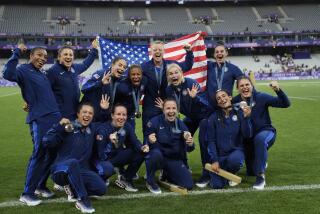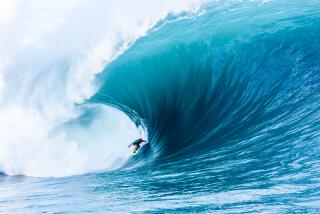34 days, 2,400 miles and one cramped boat: How 4 women set a record rowing across the Pacific
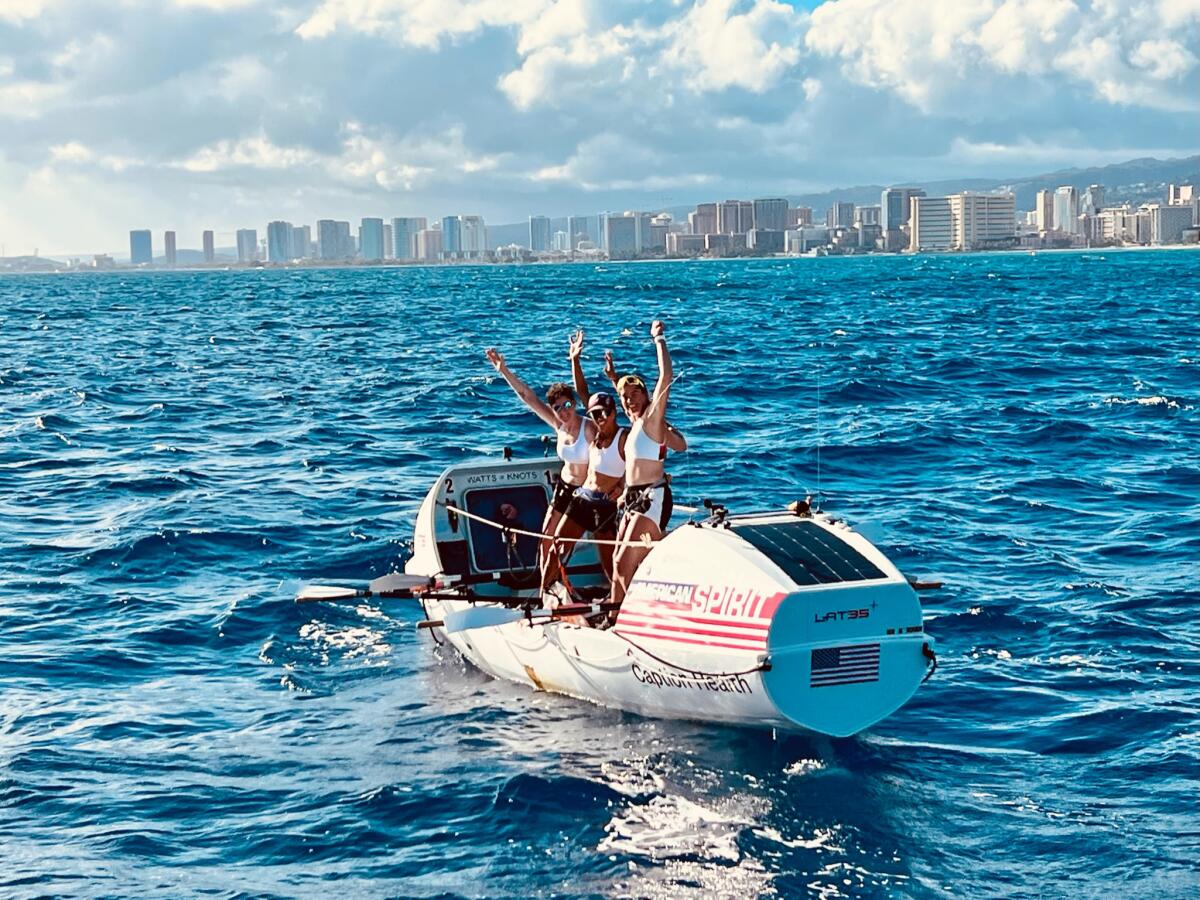
This week, after a journey that brought them from San Francisco to Honolulu, four women rowed their way to a new world record.
Libby Costello, Sophia Denison-Johnston, Brooke Downes and Adrienne Smith began their 2,400-nautical-mile Pacific crossing in June. Thirty-four days, 14 hours and 11 minutes later, the Lat35 team arrived Tuesday in the largest city in Hawaii.
All four women have ties to California. Costello and Denison-Johnston are former UCLA rowers, Downes is a former USC rower, and Smith runs a yoga studio in Santa Barbara.
To reach the finish, the women rowed in pairs for two hours at a time and slept in 90-minute increments. They made sure the boat was always moving, day or night, and documented the journey on social media, where they could be seen singing and laughing together among the waves.
But they also endured their share of extreme weather, exhaustion, seasickness and salt sores — and none of the women had ever rowed in the deep ocean.
“It kind of breaks your mind to think about what they did,” said Previn Chandraratna, who coached Costello and Denison-Johnston at UCLA. “It’s like running a marathon every day for a month. But it’s not surprising knowing who they are.”
Denison-Johnston was the first member of the crew to hear about the Great Pacific Race in February 2021. For weeks, the Olympic hopeful couldn’t get the idea out of her head. When she brought it up to Costello, her former UCLA teammate jumped on board immediately.
In college, Chandraratna said, both women were full of grit.
“They were swimming against the stream in terms of physical size in a Division I rowing program,” he said. “They had to work twice as hard to get to the level they did.”
Downes, another Olympic hopeful, got wind of the project from Costello. The two rowed together in high school. In May, Downes officially signed on and moved from New Jersey to Santa Barbara for training.
Smith, a former Ironman triathlete, met the other women through her husband, Jason Smith, who served as the team’s strength and conditioning coach. She took her first rowing strokes on the water with the team in November.
Olympic champion Sydney McLaughlin broke her own world record in the 400-meter hurdles as the U.S. outdoor track and field championships on Saturday.
Together the women made up Lat35’s first all-female crew. On board, they each had a different specialty. Denison-Johnston was the skipper and medic, Costello was the technician, Downes handled navigation and nutrition, and Smith focused on logistics.
Preparation for the journey involved intensive training sessions on land and water. The women rowed on a rowing machine three to four times a week, lifted twice a week and cross-trained in between for a total of 10 to 20 weekly hours. They also took part in life-preservation exercises such as tying knots in ice water. The goal was to prime their bodies to last as long as possible before giving out.
To bond as a team, the women went through communication exercises and took personality quizzes to understand how everyone operated. They established language that they would each use when asking for support or giving it to one another.
“It was a really healthy environment from the beginning, and we were determined to elevate each other’s greatness throughout,” Costello said. “All interactions were guided by love and empathy and understanding.”
Though the Lat35 team comprised experienced athletes, the women had little to no ocean-crossing experience. That’s where Duncan Roy, a professional ocean rowing coach, came in.
“Ocean rowing is not just rowing,” Roy said. “You have to know the weather systems, how to operate the boat, how to optimize it and how to stay safe.”
Roy’s main goal was to get the women training in a coastal environment so they could get comfortable with their boat, named the American Spirit.
When race day came, the team packed their vessel with a million calories’ worth of dehydrated, boil-to-order food and set off on the Pacific Ocean. It was enough food for 60 days, providing each person with 5,000 daily calories. The prepackaged meals included freeze-dried fettuccine Alfredo and lasagna, which were tolerable, Smith said, but each woman came to cherish their snack packs, filled with the likes of Pop-Tarts, Oreos and peanut M&M’s.
The women were strapped to the boat with harnesses, race directors monitored them 24/7 for safety, and the crew communicated regularly with a weather router, but other than that they were unassisted.
“They were so positive the whole time,” Roy said. “Everything was opportunity rather than challenge. It was so evident how good their team dynamic was.”
The women rowed an average of 70 miles each day, sleeping in little cabins on the stern and bow, jumping into the water to scrape barnacles off their boat, wiping the salt from their bodies with wet wipes and going to the bathroom in a bucket. During one leg of the journey, they were escorted by a whale.
The L.A. 2028 Olympics will be held July 14-30, organizers announce. Paralympics will begin Aug. 15. IOC likes the ‘progress and creativity’ of L.A.’s bid.
When rowing, the women would belt songs out into the ocean breeze, listen to audiobooks and tell each other life stories, all while keeping their heart rates between 90 and 100 bpm.
The boat had a satellite and Wi-Fi, but the reception was rarely good. Each crew member would only connect to the internet for a few minutes every day. Sometimes during their morning meetings, they would read the comments left by fans on their social media accounts and cry together.
“When you’re doing a hard physical challenge, there are moments where you ask yourself, ‘What in the world are we doing?’” Smith said. “But being in the company of the girls made it possible to keep going. At times we would just start laughing, just cracking up at the hilarity of it all.”
When they arrived in Honolulu, the Lat35 team was met by an ecstatic crowd of friends, family and fans. The four beat the previous women’s world record, set last year, by one day and 12 hours. The men’s world record for the Great Pacific Race is 30 days, 7 hours and 30 minutes.
According to Costello, the last three miles were the most emotional part of the journey. In their final hour together, they all sat on the deck, some rowing, some navigating, and went over their takeaways and highlights from the experience.
“We kind of recognized it was the last time that we were going to have just the four of us, maybe ever, at least definitely for the near future,” Costello said.
Watching the livestream from the U.K., Roy was holding back tears.
“I was speechless. I had goosebumps,” he said. “Even thinking about it now brings back so many emotions. I’m just so proud of them. They crushed it.”
According to Smith, the women didn’t set out to become world record holders.
“When we finished, that wasn’t the emotional part,” she said. “It was all about completing the journey and being stronger together at the end than when we started.”
Watch L.A. Times Today at 7 p.m. on Spectrum News 1 on Channel 1 or live stream on the Spectrum News App. Palos Verdes Peninsula and Orange County viewers can watch on Cox Systems on channel 99.
More to Read
Sign up for Essential California
The most important California stories and recommendations in your inbox every morning.
You may occasionally receive promotional content from the Los Angeles Times.
